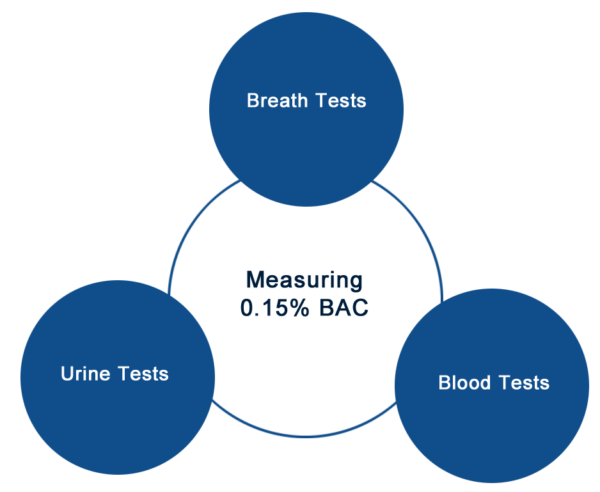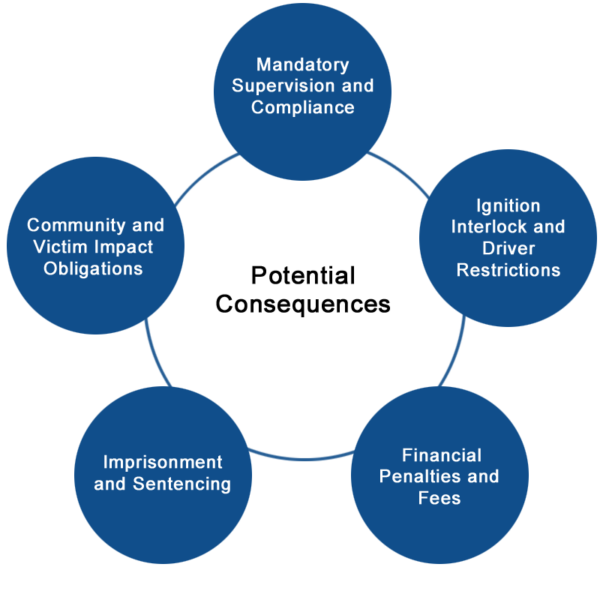Aggravated DUI
In Oklahoma, Aggravated Driving Under the Influence (DUI) is defined under Title 47, Section 11-902 of the Oklahoma Statutes. This statute outlines the offenses and penalties related to operating a vehicle under the influence of alcohol or other intoxicating substances.
Key Provisions of the Statute:
- Blood Alcohol Concentration (BAC) Limits:
-
- A person is prohibited from driving or being in actual physical control of a vehicle if they have a BAC of 0.08% or more.
- For an Aggravated DUI, the offense involves a BAC of 0.15% or higher.
- Definition:
- An Aggravated DUI occurs when a person is convicted of driving under the influence with a blood or breath alcohol concentration (BAC) of 0.15% or higher, which is nearly double the legal limit of 0.08%.A 0.08% BAC results in a standard DUI charge, while a 0.15% BAC leads to an Aggravated DUI with harsher penalties, including mandatory supervision, ignition interlock devices, and alcohol treatment. Aggravated DUIs reflect a much higher level of impairment, posing greater risks such as increased likelihood of accidents, severe injuries, or fatalities. These heightened dangers result in more severe legal and social consequences for those charged.
 Devices Used to Measure 0.15% BAC for Aggravated DUI in Oklahoma
Devices Used to Measure 0.15% BAC for Aggravated DUI in Oklahoma
In Oklahoma, a BAC of 0.15% or higher, which qualifies for an Aggravated DUI, can be measured using the following methods:
1. Breath Tests
- Devices: Breathalyzers, such as the Intoxilyzer 8000, or similar devices approved by Oklahoma law enforcement.
- How It Works: The driver blows into the device, which measures the alcohol concentration in their breath and calculates an estimated BAC level.
2. Blood Tests
- Devices: Laboratory-grade equipment, such as gas chromatography, is used for precise BAC measurement.
- How It Works: A blood sample is drawn—typically at a hospital or police station—and analyzed to determine the exact alcohol content in the bloodstream.
3. Urine Tests
- Devices: Laboratory equipment designed to detect alcohol metabolites in urine.
- How It Works: A urine sample is tested to confirm the presence of alcohol or its byproducts. However, this method is less reliable for determining current BAC levels and is often used as a secondary option.
Legal Considerations
- Timing: BAC results must be obtained within two (2) hours of the individual’s arrest to be admissible in court under Oklahoma law.
- Accuracy: Devices must be properly calibrated, and tests must be conducted by certified personnel to ensure reliability and compliance with legal standards.
Challenging the Test Results
With a skilled attorney, you can challenge the accuracy and reliability of breath, blood, or urine test results. These machines are prone to errors, and even blood tests can be contested for mishandling, contamination, or improper procedures. If successfully challenged, this can lead to your Aggravated DUI charge being dismissed, reduced, or resulting in acquittal at trial.
 Potential Consequences for Aggravated DUI in Oklahoma
Potential Consequences for Aggravated DUI in Oklahoma
The consequences outlined below are not absolute, as every case is unique and subject to the specific circumstances involved. Additionally, outcomes may vary depending on the discretion of the presiding judge or court of law.
- Mandatory Supervision and Testing:
-
- At least one (1) year or more of supervision, including periodic alcohol and drug testing at the offender’s expense.
- Ignition Interlock Device (IID):
-
- Installation of an IID on all vehicles for a minimum of 90 days or more, as required by law.
- Assessment and Treatment:
-
- Completion of an alcohol and substance abuse evaluation.
- Mandatory compliance with all recommended treatment programs, including inpatient or residential treatment if deemed necessary, or more.
- Imprisonment:
-
- Sentences may include jail time or imprisonment in the custody of the Department of Corrections, depending on prior convictions:
- First Offense: Jail for at least 10 days to 1 year or more.
- Repeat Offenses: Prison time ranging from 1 year to 20 years or more, depending on the severity and history.
- Sentences may include jail time or imprisonment in the custody of the Department of Corrections, depending on prior convictions:
- Fines:
-
- Up to $1,000 or more for first offenses.
- Up to $2,500 or $5,000 or more for felony-level repeat offenses.
- Community Service:
-
- Completion of 240 to 480 hours or more of community service for repeat offenses.
- Victim Impact Panel:
-
- Attendance at a Victim Impact Panel program (if available in the county), with a fee of $75 or more.
- Driver’s License Reinstatement:
-
- Suspension or revocation of driving privileges, with reinstatement requiring compliance with statutory requirements, including IID installation, or more.
- Drug Abuse Education Fee:
- Payment of a $100 fee or more to the Drug Abuse Education and Treatment Revolving Fund.
- Prohibition on Fine Substitution:
- Community service hours cannot be substituted with a monetary fine or more.
- Enhanced Penalties for Child Endangerment:
- If convicted while transporting a minor under 18, the fine is doubled or more, and additional penalties may apply.
 Save Your Ability to Drive
Save Your Ability to Drive
Being charged with an aggravated DUI in Oklahoma comes with two serious consequences. First, the state will try to suspend your license, taking away your ability to drive. Second, they aim to secure a criminal conviction that could stay on your record permanently, affecting your future opportunities. Losing your license and carrying a lifelong criminal record can have devastating impacts—you need to act quickly to protect yourself.
To fight for your driving privileges, you have only 30 days from the date of your arrest to request a hearing with the Oklahoma Department of Public Safety (DPS). This hearing is critical because it’s your chance to challenge the suspension of your license and ensure that the rules of your arrest were properly followed. By hiring an experienced attorney to represent you at this hearing, you not only stand a better chance of keeping your license, but you also set the foundation for fighting your criminal charges. A skilled attorney will use this hearing to gather evidence, scrutinize the legality of the DUI stop, and start building a strong defense to get your aggravated DUI charge reduced, dismissed, or defeated in court.
If you don’t request a hearing within 30 days, your license will automatically be suspended without any opportunity to appeal. In cases involving blood tests instead of breath tests—or if you refused to test—the 30-day period begins when you receive official notice that your test results exceeded the legal limit. Challenging the suspension not only gives you a shot at retaining your license but could also help you avoid penalties like ignition interlock requirements and other lasting consequences.
Clients who take the bold step of contesting their license suspension often see positive results not just in keeping their ability to drive but also in the outcome of their criminal cases. Taking a stand early demonstrates courage and determination, and it often leads to better outcomes both on the road and in court.
FAQs About Aggravated DUI in Oklahoma
- What constitutes an Aggravated DUI in Oklahoma Over a regular DUI in Oklahoma? Oklahoma has no tolerance for drivers exceeding the legal BAC limit of 0.08%. Today, you can be arrested with any detectable amount of alcohol in your system, and a BAC of 0.15% or higher is considered a significant risk to public safety.
- Is an Aggravated DUI considered a felony in Oklahoma? An Aggravated DUI in Oklahoma becomes a felony if it involves serious bodily injury or death, prior DUI convictions within 10 years, child endangerment, and other aggravating factors.
- Can a first-time DUI offense be charged as an Aggravated DUI? Yes, if the driver’s BAC is 0.15% or higher, a first-time offense can be charged as an Aggravated DUI, leading to enhanced consequences.
- What is an ignition interlock device (IID), and when is it required? An IID is a breathalyzer installed in a vehicle that prevents it from starting if alcohol is detected in the driver’s breath. In Oklahoma, individuals convicted of an Aggravated DUI are required to install an IID on every vehicle they own or that is registered to them.
- Can an aggravated DUI be reduced to a normal DUI or Be Dropped?
An Aggravated DUI charge has the potential to be reduced to a standard DUI or even dismissed under certain conditions, particularly if there are valid challenges to the accuracy of the reported blood alcohol concentration (BAC) of 0.15% or higher. The specific circumstances of the case and the evidence presented will play a critical role in determining the outcome.
BAC readings of 0.15% or more are not always accurate and can be affected by various factors. Malfunctioning or poorly maintained breathalyzer equipment is a common source of error. If the device has not been properly calibrated, it may produce unreliable results. Similarly, residual alcohol in the mouth from recent drinking, using mouthwash, or burping can artificially inflate BAC levels. Medical conditions such as acid reflux, known as GERD, or ketosis, which can occur in individuals with diabetes or those following a low-carbohydrate diet, may also interfere with the accuracy of BAC readings by mimicking alcohol in the breath.
Testing errors are another significant issue that can undermine BAC reliability. Mistakes made during the administration of breath, blood, or urine tests can lead to flawed results. Blood samples that are mishandled, improperly stored, or contaminated during processing may also produce incorrect BAC levels. Additionally, individual physiological differences, such as variations in lung capacity or metabolic rates, can affect breathalyzer results. In some cases, delays in testing may result in BAC readings that reflect alcohol absorption peaks rather than the actual concentration at the time of driving.
Because the penalties for an Aggravated DUI are severe, it is essential to examine all aspects of BAC testing and the surrounding circumstances thoroughly. Identifying and addressing inaccuracies or procedural errors can significantly impact the case and may lead to reduced charges or dismissal.
 Challenge and Beat Your Aggregated DUI Charge
Challenge and Beat Your Aggregated DUI Charge
At the Edge Law Firm, we believe every aggravated DUI case is winnable. This isn’t just talk—it’s a principle we prove through relentless preparation and a commitment to outworking the prosecution. When we step into a hearing or negotiation, we’re armed with more knowledge, better preparation, and a stronger strategy, which gives us the upper hand time after time.
Our proven track record speaks volumes. We’ve consistently achieved dismissals, acquittals, and charge reductions by uncovering critical details others often miss. From the very beginning, we take a comprehensive approach to your case—collecting evidence, interviewing witnesses, reviewing records, and identifying mistakes made by law enforcement, laboratories, or other agencies. Every piece of information becomes a vital element of your defense.
Even before trial proceedings begin, we leverage these findings to negotiate assertively with prosecutors. If they refuse to drop or reduce the charges, we’re fully prepared to take your case to trial. Armed with a meticulously crafted strategy, we’ll expose flaws in their arguments and fight relentlessly to safeguard your rights and freedom.
Take the first step today by scheduling a free, no-obligation case review. The sooner we begin, the stronger your defense will be. There’s everything to gain and nothing to lose.
Please submit our secure contact form below:
